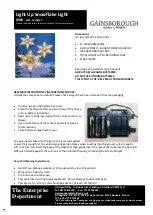
GB
11
personal injury by flying debris or acci
-
dentaI contact with the saw chain.
•
Do not operate a chain saw in a
tree.
Operation of a chain saw while
up in a tree may result in personal in
jury.
•
Always keep proper footing
and operate the chain saw only
when standing on fixed, secure
and level surface.
Slippery or un-
stable surfaces such as ladders may
cause a loss of balance or control of
the chain saw.
•
When cutting a branch that
is under tension be alert for
spring back.
When the tension in
the wood fibres is released the spring
loaded Iimb may strike the operator
and/or throw the chain saw out of
control.
•
Use extreme caution when cut-
ting brush and saplings.
The slen-
der material may catch the saw chain
and be whipped toward you or pull
you off balance.
•
Carry the chain saw by the
front handle with the chain saw
switched off and away from
your body. When transporting
or storing the chain saw always
fit the guide bar cover.
Proper
handling of the chain saw will reduce
the Iikelihood of accidentaI contact
with the moving saw chain.
•
Follow instructions for lubri-
cating, chain tensioning and
changing accessories.
Improperly
tensioned or lubricated chain may
either break or increase the chance for
kickback.
•
Keep handles dry, clean, and
free from oil and grease.
Greasy,
oily handles are slippery causing loss
of control.
•
Cut wood only. Do not use chain
saw for purposes not intended.
For example: do not use chain
saw for cutting plastic, masonry
or non-wood building materials.
Use of the chain saw for operations
different than intended could result in a
hazardous situation
• Hold the power tool only on
the insulated handle surfaces,
as the saw chain can come into
contact with concealed power
lines or the mains cable to the
equipment.
Contact between the
saw chain and a live wire can make
metal parts of the equipment live and
cause an electric shock.
Causes and operator preven-
tion of kickback
Beware of kickback! Be careful of
kickback of the machine during
work. There is danger of injury
here. You can avoid kickbacks by
exercising caution and using a cor-
rect sawing technique.
b
a
Bild 1
• Kickback may occur when the nose or
tip of the guide bar touches an object,
or when the wood closes in and pinch-
es the saw chain in the cut
(cf. fig. b).
• Tip contact in some cases may cause
a sudden reverse reaction, kicking the
guide bar up and back towards the












































